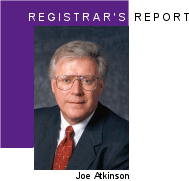|

By Joe Atkinson
Teachers
hold a position of sacred trust in our society. Rightly so.
Teachers maintain the highest standards of moral integrity and continually
rise to the expectations parents have of teachers to instruct, support,
mould, challenge and inspire their children.
As law-abiding, caring, compassionate people dedicated to the education
of our young people, teachers are repulsed any time a news story breaks
about sexual abuse involving students. They abhor the thought of a child's
safety and trust being compromised. They find repugnant the notion that
the actions of a few might sully the reputation of all in the profession.
To protect students and to assist all educators, the College has issued
a Professional Advisory: Professional
Misconduct Related to Sexual Abuse and Sexual Misconduct. The
advisory aims to help College members prevent the sexual abuse of students
and sexual misconduct. It does so by identifying the legal, ethical and
professional parameters that govern members' behaviour.
Focus on Prevention
The advisory clearly defines the terms of sexual abuse, sexual harassment
and sexual relationships in the context of professional misconduct. It
lets members know what behaviour is not acceptable, what to watch for,
and what duties they have to report when they suspect that something is
wrong.
The idea for an advisory came from the Hon. Sydney L. Robins in his April
2000 report Protecting Our Students: A review to identify and prevent
sexual misconduct in Ontario schools.
Upon release of that report, six standing committees of the College began
work to implement many of the 36 recommendations that fell within or affected
the College mandate. In addition, we hosted a working session in February
2001 involving the various education stakeholders and those responsible
for the care and safety of children within the broader community to discuss
what more could be done. The participants strongly supported the creation
of a professional advisory on the issue.
In October 2001, in a brief to the Standing Committee on Justice and Social
Policy, the College had a chance to share its concerns with the government
about Bill 101, the Student Protection Act, the province's answer
to the Robins report. We felt the proposed legislation required stronger
language to identify those who might be grooming children for sexual abuse.
We also recommended toughening the process for reporting to make it as
difficult as possible for sexual abusers or predators to simply leave
a job in one school or jurisdiction and be hired with impunity in another.
In September of this year, the Student Protection Act came into
force. In October, the College released its advisory-making good on its
promise to those in the profession to provide clarity, direction and support
for members ensuring that they understand their legal, moral and ethical
responsibilities as professionals.
Provides Guidance
Many of Ontario's regulatory bodies issue communiqués that offer
advice, guidance, and clarification on professional issues to members.
They have done so for many years. Some, like ours, stem from new legislation.
Some, like ours, are issued to broaden awareness and raise public trust
in the profession by contributing to the consistent application of professional
standards.
Built on the Standards
of Practice for the Teaching Profession and the Ethical
Standards for the Teaching Profession, our first advisory honours
the experience, wisdom and good judgement of good teachers across the
province by reinforcing sound practices and appropriate professional behaviour.
It also puts potential abusers on alert. Misguided impulses or deliberate,
nefarious actions of a sexual nature against students will not be tolerated.
I am proud that the profession has seen it as necessary to take this important
step to communicate openly and broadly on this issue.
For me, the advisory reinforces that sacred trust, the earned and well-deserved
faith in teachers by the public to ensure students' safety on their journey
of lifelong learning.
|
![]()

